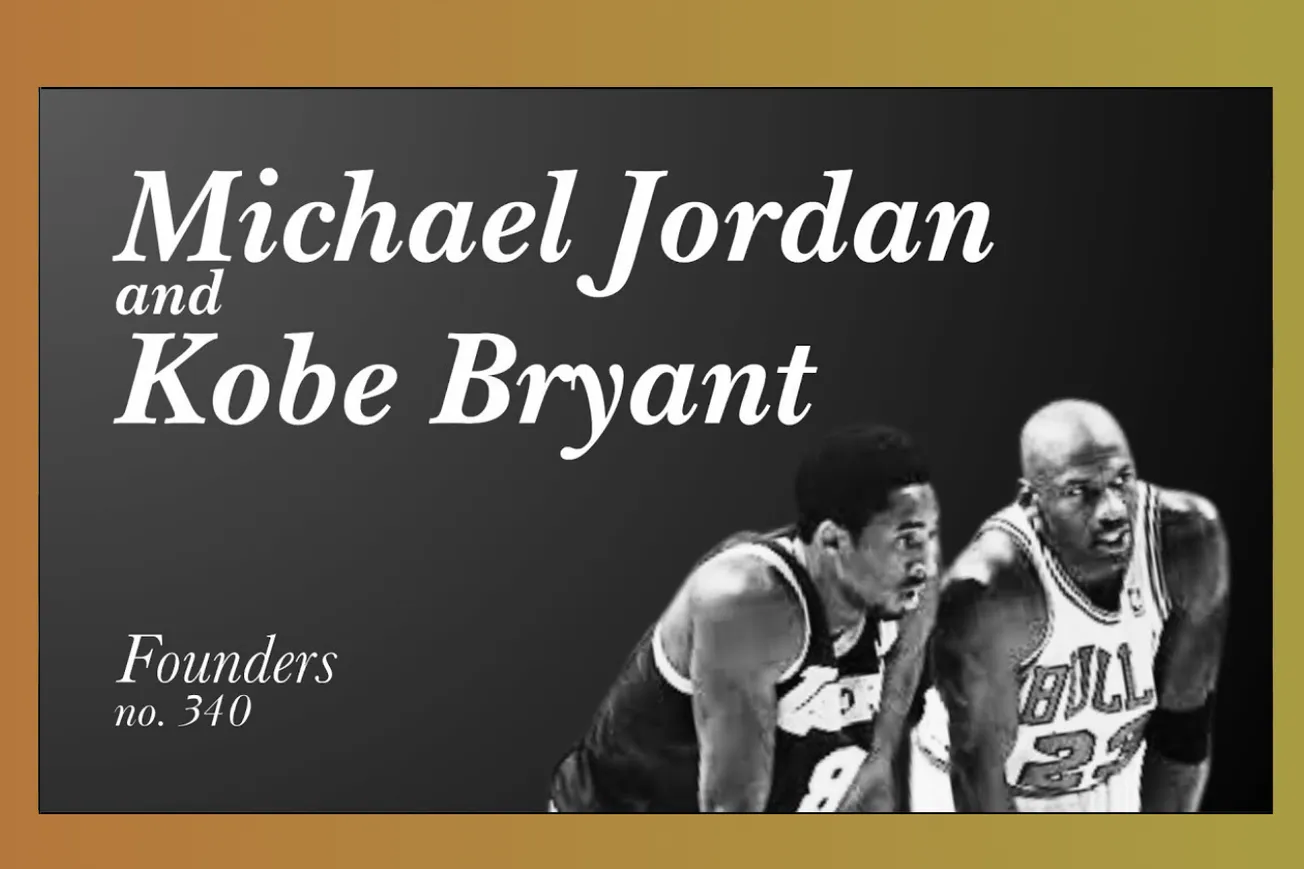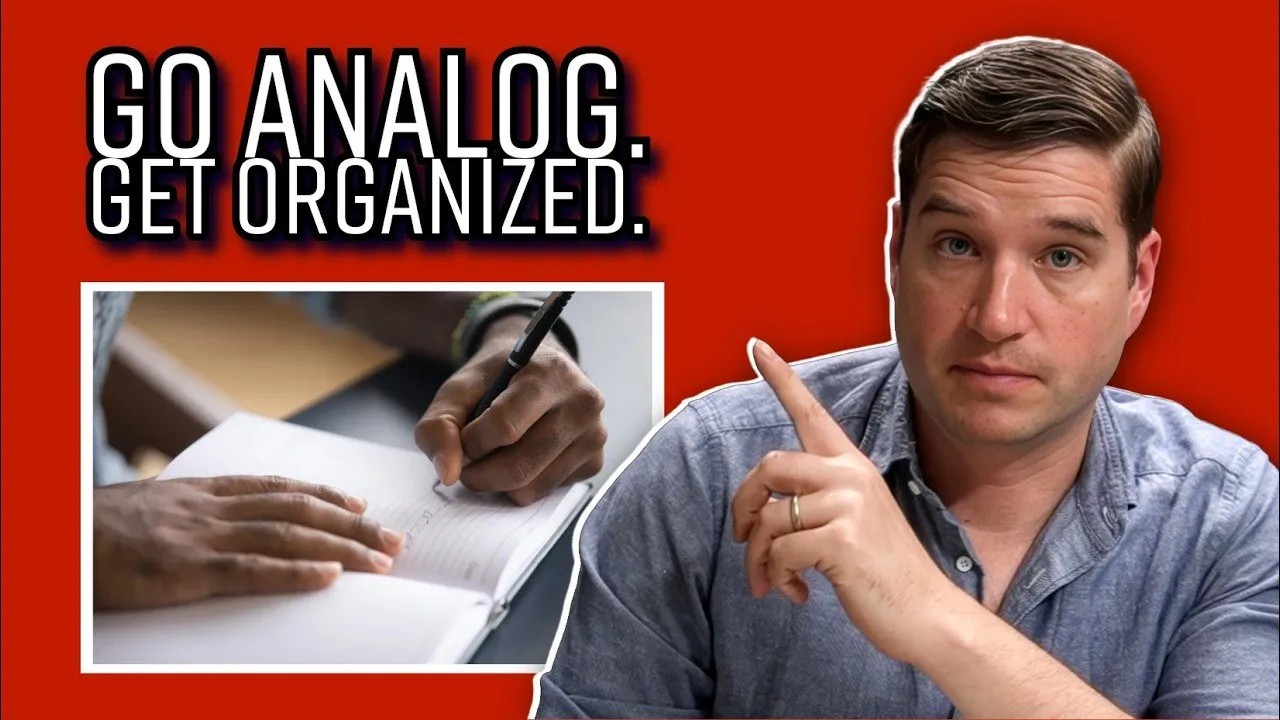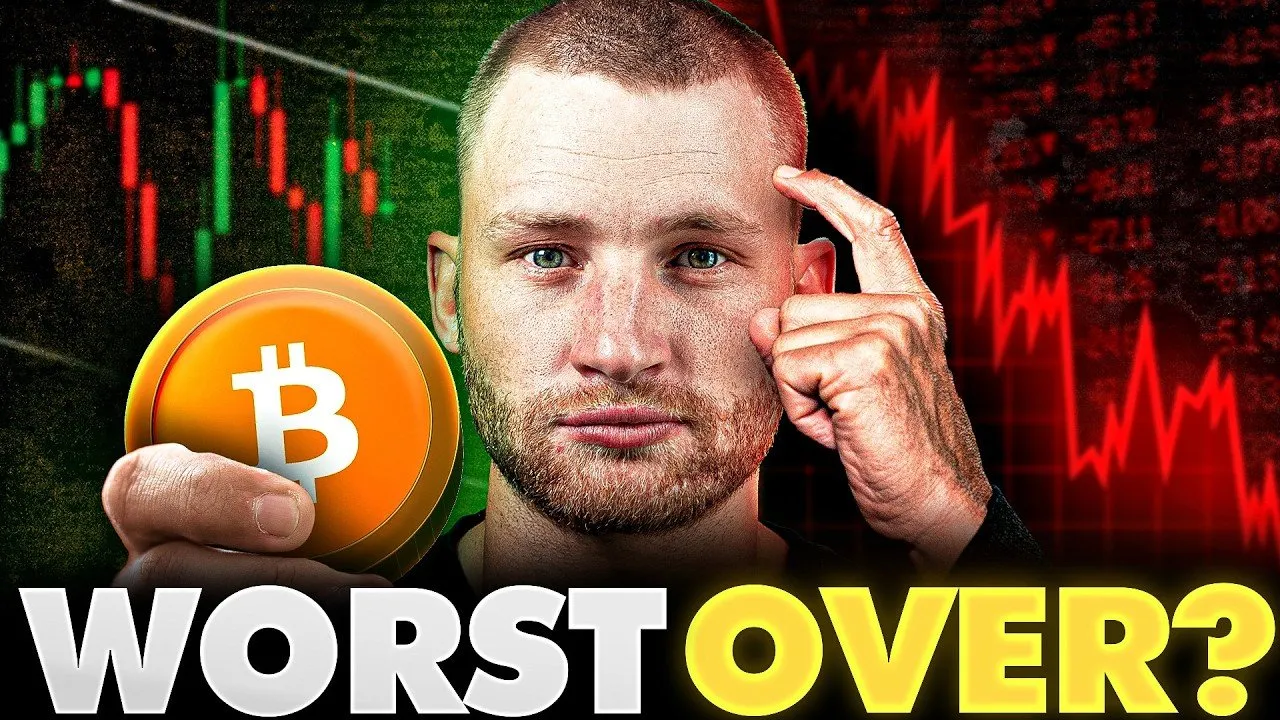Table of Contents
Tim Grover, who trained both Michael Jordan and Kobe Bryant for 15 years, reveals the extreme mindset and uncompromising standards that separated these legends from every other player.
Key Takeaways
- Jordan and Kobe never lowered their standards to accommodate others - they demanded everyone rise to their level or leave
- Their success came from mastering fundamentals relentlessly rather than focusing on flashy moves or complex strategies
- Both possessed unshakeable self-confidence that never wavered, with mental toughness stronger than their physical abilities
- They sought out pressure and difficulty as fuel, using trash talk and challenges to heighten their own performance standards
- Neither ever stopped learning, constantly studying game film and seeking advice from previous generations of great players
- Their "dark side" included ruthless treatment of teammates who couldn't match their commitment to excellence
- Both trusted themselves more than anyone else and took complete responsibility for team success or failure
- They altered their entire lives around winning, viewing everything else as secondary to competitive achievement
- Jordan and Kobe shared an addiction to the "exquisite rush of success" that drove them to continue competing long after financial needs were met
The Foundation: Never Compromise Your Standards
The defining characteristic of both Michael Jordan and Kobe Bryant was their absolute refusal to lower their standards to accommodate others, instead demanding that everyone around them rise to meet their level of excellence.
- Tim Grover observed that their strategy was simple: "make everyone else get on your level - you are not going down to theirs, you're not competing with anyone else ever again, they're going to have to compete with you"
- Jordan's philosophy emerged from his early struggles in Chicago: "we were terrible when I got here and we elevated to being a championship quality team - there are certain standards that you have to live by, you do not come here fooling around"
- This mentality extended to every interaction, with teammates consistently reporting that both players expected the same level of commitment from others that they demanded from themselves
- Their refusal to compromise created what Grover called a "cult-like" atmosphere where mediocrity was not tolerated: "if you're aiming to be the best at what you do, you cannot worry about whether your actions will upset other people"
- The approach proved effective because it forced everyone in their orbit to either elevate their performance or remove themselves from the equation
- Both players understood that maintaining championship-level teams required consistent enforcement of these standards: "you ask all my teammates the one thing about Michael Jordan was that he never asked me to do something that he didn't do"
Their uncompromising approach to standards created environments where excellence became the only acceptable outcome.
Mental Dominance: Controlling the Mind
Jordan and Kobe's greatest weapon wasn't physical ability but their stunning capacity to control their minds and emotions under extreme pressure.
- Jordan's mental approach was foundational: "you can't excel at anything before you train your mind - mental dominance is what ultimately makes you unstoppable"
- Both players developed techniques for managing negative thoughts: "the mind will play tricks on you, telling you that you couldn't go any further, telling you how much it hurt - but you have to see past that, you have to turn it all off"
- Their ability to stay present was legendary, with Jordan being described as "a mystic" who "was never anywhere else - his gift was that he was able to be completely present"
- Fear and nervousness were reframed as advantages rather than obstacles: "if I'm feeling nervous, how the hell are they feeling? They have to deal with me" - converting anxiety into competitive fuel
- Kobe articulated the psychological challenge clearly: "the greatest fear we face is ourselves - we all have dreams and it's very scary sometimes to accept the dream that you have"
- Their mental toughness extended to owning mistakes without explanation: "when Kobe or Michael made a mistake they would look you in the eye and say 'I f*cked up' - confident, simple, factual, no explanation"
This mental mastery allowed them to perform at their highest level when stakes were highest.
Fundamentals Over Flash: Mastering the Basics
Despite their highlight-reel careers, both Jordan and Kobe built their greatness on relentless attention to fundamental skills rather than complex techniques.
- Their philosophy was simple: "at some point you've made something simple into something complicated" - they consistently returned to basics when others overcomplicated their approach
- Jordan's practice routine exemplified this: "every time he warmed up in practice he started with a chest pass - the greatest player in the world working on a basic chest pass"
- When asked what he did for a living, Kobe's response captured their mentality: "I give out numbers - I gave them 81 or I gave them a triple double or I gave those guys 61 points"
- They understood that fundamentals provided the foundation for everything else: "for all of Michael's amazing moves and unforgettable moments, he knew that none of that could happen without the fundamentals"
- This extended to their business approach as well, with Jordan explaining: "my game was my biggest endorsement - my dedication to the game led to all this other stuff"
- Their focus on basics allowed them to perform consistently: "Michael Jordan worked on consistency relentlessly" because they knew that time and repetition would compound their advantages
Mastery of fundamentals became their competitive moat that others couldn't replicate.
Pressure as Fuel: Seeking Difficulty
While most athletes tried to minimize pressure, Jordan and Kobe actively sought out high-stakes situations and used conflict as motivation for peak performance.
- Grover's interpretation of Jordan's legendary trash talking revealed its true purpose: "I always felt Michael's legendary trash talking wasn't meant for the other guy - it was another way for him to heighten the pressure that he put on himself"
- Both players discovered early that increased pressure correlated with better performance: "the more pressure that he heaped on himself, the greater his ability to rise to that occasion"
- Their internal standards exceeded any external expectations: when asked about fan pressure, Kobe's immediate response was "their expectations will never be higher than my own"
- They used confidence as psychological warfare, with Jordan telling teammates during recruitment calls: "we're winning with or without you" because his self-belief was so absolute
- Both players understood that pressure separated elite performers from everyone else: "pressure keeps you sharp, it challenges you in ways you've never imagined and forces you to solve issues that send weaker people running for cover"
- Their approach to competition was to increase stakes rather than decrease them: "I thrive on that - I think that is my biggest motivation in life, I find certain competitions in life and I try to overcome them"
They transformed pressure from an obstacle into their primary source of competitive advantage.
Never Stop Learning: Insatiable Knowledge Appetite
Despite reaching the pinnacle of their sport, both Jordan and Kobe maintained an insatiable appetite for learning that continued throughout their careers.
- Kobe's study habits became legendary: "Kobe had a closet full of VHS tapes of all of Michael's games and they would just watch him over and over again"
- Their learning extended beyond just watching - they actively sought mentorship: "Kobe would call or text Mike in the middle of the night asking how he played against a certain guy, how he handled a situation"
- Jordan's willingness to share knowledge demonstrated another trait of greatness: "that is a major trait of the greats - they want to pass along their knowledge so the next generation can keep learning"
- Both players reinvested heavily in their education: "they can take everything away from you - your house, your money, your clothes, your car - but one thing they can't take is your education and what you've learned"
- Their learning was systematic and purposeful: "Kobe wanted to learn everything he could about MJ - the program, the schedule, the workouts, the whole team - he wanted knowledge not so he could become MJ so he could become better Kobe"
- This continuous learning created what Grover called "an unstoppable internal resource that you can draw on in any situation"
Their commitment to lifelong learning gave them advantages that accumulated over decades.
The Dark Side: Ruthless Standards for Others
Jordan and Kobe's pursuit of excellence came with a dark side that included ruthless treatment of teammates who couldn't match their commitment levels.
- Their approach to underperforming teammates was unforgiving: "Michael stormed there where poor Scott was on the table getting treatment - grabbed the table with Scott still on it and completely flipped it over"
- The intensity was constant and personal: "every day those teammates had to show up to face him in practice completely dreading what was ahead - not because practices were hard but because they knew they had to deal with him"
- Their mentality toward team building was clear: "when you're the guy at the top, it's on you to pull everyone else up there with you or everything you've built comes crashing down"
- Both players understood that compromise would destroy their teams: "Jordan demands excellence of himself and he has no tolerance for those who can't or won't rise to that level"
- Yet teammates respected this approach because they never asked others to do what they wouldn't do themselves: "he never asked me to do something that he didn't do"
- The key was that strength, not weakness, earned their respect: Steve Kerr gained Jordan's trust by fighting back during a practice altercation rather than backing down
Their ruthlessness was systematic rather than personal - focused on maintaining championship standards.
Complete Self-Reliance: Trusting Only Themselves
Both players developed an extreme level of self-reliance that extended to trusting their own judgment above all external input or assistance.
- Their fundamental belief was simple: "Jordan mostly believed in himself - all others were open to question"
- This self-reliance was learned through experience: "at some point they learned that they can only trust themselves - maybe it was a lesson they learned in childhood or something that happened later in life"
- Their approach to decision-making reflected this: "trusting others is the same as giving up control and they usually have a painfully hard time with that"
- Both players realized early that self-reliance was survival: "they realized that to survive and succeed they could never take their hands off the wheel"
- This extended to their business decisions as well, with both maintaining control over their careers and financial decisions rather than delegating to others
- Their self-reliance was powered by an internal drive: "I just feel my competitive drive is far greater than anyone else that I've ever met - I thrive on that"
Complete self-reliance became both their greatest strength and their most isolating characteristic.
Addiction to Winning: Everything Else Is Secondary
What separated Jordan and Kobe from other successful athletes was their genuine addiction to the feeling of winning itself, rather than the rewards that came with it.
- Their motivation transcended money: "entrepreneurs are people whose mind and energies are constantly being used at peak capacity" - they were fully alive only when competing at the highest level
- Grover identified their core drive: "he's addicted to the exquisite rush of success and he'll alter his entire life to get it"
- Both players understood that everything else was secondary: "everything Kobe does is all about excellence, everything - nothing else matters"
- Their focus was singular and unwavering: "everything everything revolves around being on top and staying there - that's why we work so well together, he has one focus and I have one focus"
- Even in retirement, this competitive drive continued: Jordan in his 50s taking away his team's Jordan gear and beating NBA starters with bench players because they weren't performing to his standards
- Their definition of winning was comprehensive: Kobe's one-word description was "everything" because winning affected every aspect of their existence
This addiction to winning itself, rather than its byproducts, sustained them through decades of extreme effort.
Jordan and Kobe's approach to excellence reveals that true greatness requires more than talent or hard work - it demands a complete reorganization of one's life around a single objective. Their relentless mentality created standards so high that they transformed not just their own performance but the performance of everyone around them. While their methods were often harsh and their standards uncompromising, they proved that exceptional results require exceptional commitment. Their legacy demonstrates that when you refuse to accept anything less than the best from yourself and others, you create an environment where greatness becomes inevitable.
Practical Implications
- Never lower your standards to accommodate others - Instead of compromising excellence, create environments where people must rise to meet higher expectations or remove themselves
- Master fundamentals relentlessly before pursuing advanced techniques - Jordan and Kobe built their greatness on basic skills practiced to perfection rather than complex strategies
- Reframe pressure as fuel rather than obstacle - Use high-stakes situations and external expectations to elevate performance rather than allowing them to create anxiety
- Develop unshakeable self-confidence through preparation - Both players' mental toughness came from knowing they had prepared more thoroughly than anyone else
- Create systems that eliminate decisions during performance - Jordan's detailed game-day routines freed his mind to focus on the unpredictable aspects of competition
- Study your craft continuously regardless of current success level - Both players never stopped learning from predecessors and seeking new knowledge throughout their careers
- Take complete responsibility for team outcomes - Leaders must own all results rather than deflecting blame or sharing accountability with others
- Invest heavily in the fundamentals that drive your core performance - Jordan and Kobe spent fortunes on training, health, and skill development as business investments, not luxuries
- Trust your own judgment above external input when stakes are highest - Develop decision-making confidence through experience rather than relying on others' opinions
- Focus on being excellent at one thing rather than good at many - Both players understood that dominance in their core skill opened all other opportunities





